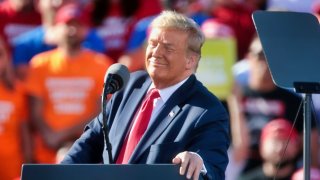North Korea Might Ignore Donald Trump If He Takes Back the White House
Having been burned once or twice by Trump, North Korea's Kim Jong-un is not eager to try again. In truth, he has already gotten what he most wanted from Trump: international legitimacy.
During a recent visit to Seoul, every conversation I had quickly got down to one key question: “What happens if Trump is reelected?” This was quickly followed by: “What will it mean for the Alliance?”; “What will it mean for US-DPRK relations?”
In an attempt to reassure my colleagues -- or perhaps to at least reassure myself -- my response was “Less than you might imagine!”
Trying to predict what Donald Trump might say or do is a fool’s errand. But Pyongyang is more predictable. The reason I say “less than you might imagine” is because, whatever a second Trump administration might try vis-à-vis Pyongyang -- olive branch or saber-rattling -- it is likely to be ignored by the North for several reasons.
First, having been burnt once or twice already by Trump, Kim Jong-un is not going to be eager to try again. In truth, Kim Jong-un has already gotten what he most wanted from Trump: international legitimacy. Why risk getting the rug pulled out from under him again, just for another photo op? Kim certainly understands the prospects of getting unrestricted aid from Trump 2 (or Biden 2 or any other US administration) at this point are slim to none.

And he no longer has to! An (admittedly oversimplified) overview of history shows that North Korea survived for decades by playing its two main patrons, Moscow and Beijing, against one another. Then the Soviet Union collapsed and Kim’s grandfather and father, worried about overreliance on China, began overtures toward Seoul and Washington, with mixed results. But now Russia is back. Not only is it back, but Vladimir Putin, who in the past did not hesitate to show his disdain for the Kim dynasty, stands on the curbside, hat in hand, when Kim III arrives.
As a result, Kim Jong-un has made it pretty clear he is no longer interested in talking to either Washington or Seoul (or Tokyo for that matter, as he continues to reject Prime Minister Kishida’s overtures as well). A change in administration in Washington is not likely to change this.
The likelihood that either Beijing or Moscow would apply pressure on Kim to enter into negotiations with Washington or Seoul is likewise pretty slim. Both see the value in keeping the North Korean threat alive, as one struggles with Ukraine and the other continues to apply pressure on Taiwan. While ROK President Yoon is seen by some as a “lame duck” following his party’s poor showing in last month’s National Assembly elections, there is little chance he will change his get-tough policy toward the North or stop reinforcing and strengthening the ROK-US alliance.
I suspect that Pyongyang (and Beijing and Moscow) will be more interested in seeing what kind of damage a second Trump administration will do to US-ROK relations than how it will impact US-DPRK relations.
My answer here is also “less than you might imagine.” True, candidate Trump is already saying things that are making alliance supporters in Seoul and Tokyo (and Washington, and Europe, and almost everywhere else) very nervous. But, if the past is a precedent (and it often, but not always, is), then it’s useful to distinguish between what then-President Trump said and what the Trump administration did when he was last in office.
The former Trump administration’s National Security Strategy document, which outlines and guides US policy, was remarkably similar to those that preceded and followed it when it came to the discussion of US alliances. This is because, while political parties and political rhetoric and catchphrases change from administration to administration, US national interests seldom shift dramatically. President Trump’s negotiating style certainly differed from most others who have held the job, but the centrality of the US alliance network as the “foundation” of US policy has changed little in the past 75 or more years.

Also, recall that Candidate Trump is not the first presidential aspirant to threaten to remove U.S. forces from Korea. That “honor” goes to Jimmy Carter, who discovered as president that this was easier said than done. And that was before the National Defense Authorization Act for FY2024 insured that no future US president (read: Trump) could unilaterally remove US forces from Europe or Asia without Congressional approval, demonstrating that the US system of checks and balances remains alive and well. (It also signals a realization that many in Congress on both sides of the political divide share Korea’s fears about the future of the alliance.)
About the Author: Ralph Cossa
Ralph Cossa is president emeritus and Worldwide Support for Development – Handa Haruhisa Chair at the Pacific Forum in Honolulu. Cossa has been with the Pacific Forum since 1993, first as Executive Director, then (2001-2018) as President, and now as President Emeritus and WSD-Handa Chair in Peace Studies. He is a member of the ASEAN Regional Forum’s Experts and Eminent Persons Group and a founding member of the Council for Security Cooperation in the Asia Pacific’s Steering Committee. Mr. Cossa is a political/military affairs and national security specialist with more than 50 years of experience in formulating, articulating, and implementing US security policy in the Asia-Pacific and Near East–South Asia regions. Mr. Cossa served in the U.S. Air Force from 1966 to 1993, achieving the rank of colonel and last serving as special assistant to the commander of the US Pacific Command. He previously served as Deputy Director for Strategic Studies at the National Defense University’s Institute for National Strategic Studies and earlier as a national security affairs fellow at the Hoover Institution at Stanford University.
All images are Creative Commons.


